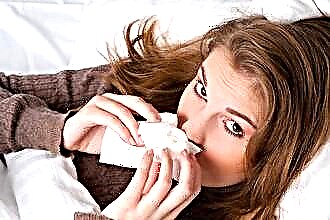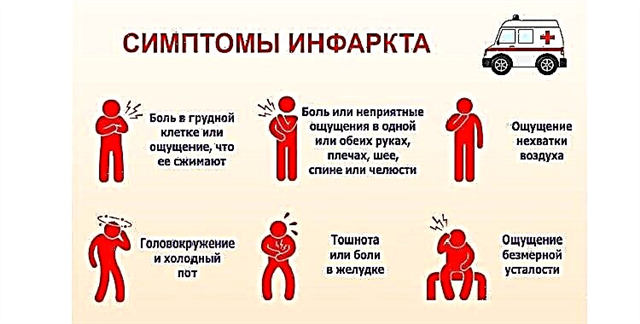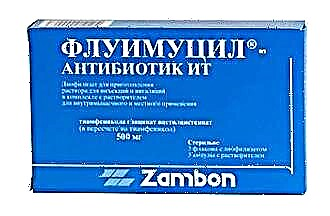Allergic rhinitis (hay fever) is an inflammation of the nasopharynx, accompanied by an abundant discharge of nasal secretions (rhinorrhea) and respiratory failure. The development of the disease is based on allergic reactions that occur in response to irritating substances. Sprays from allergic rhinitis stop undesirable processes in the nasal cavity, due to which the swelling of the mucous membrane, rhinorrhea, itching and inflammation disappear.
Treatment of allergic rhinitis consists in the use of local preparations of vasoconstrictor, anti-allergic, immunostimulating and anti-inflammatory action. The therapy regimen includes sprays of several pharmacological groups, which allows you to quickly eliminate allergic manifestations and prevent complications. The article discusses the best types of aerosols for intranasal administration, their principle of action and features of application.
Treatment principles

In fact, an allergic rhinitis is an inadequate immune response to the penetration of allergens into the respiratory system. Contact of the nasopharyngeal mucosa with fungal spores, strong odors, dandruff and other irritating agents causes an immediate allergic reaction in the body. Allergens are perceived by the immune system as pathogens to be destroyed. Therefore, with repeated penetration of irritating substances into the respiratory system, inflammation occurs.
Therapy for allergic rhinitis consists in the use of symptomatic medications. Absolutely all local and systemic medications only alleviate the symptoms of the disease, but they cannot change the body's immune response to the action of certain irritating substances. With the help of nasal aerosols, you can reduce the severity of allergic manifestations and accelerate the regression of inflammation in the nasal cavity.
With an exacerbation of hay fever, it is very important to identify and eliminate the allergen that caused the rhinorrhea in time.
The treatment regimen for hay fever depends on the severity of the allergic manifestations:
- with a mild course of the disease, it is enough to eliminate the causal allergen and use antihistamine nasal agents;
- intermittent (seasonal) allergic rhinitis is treated for at least 2-3 weeks not only with antiallergic aerosols, but also with topical glucocorticosteroids;
- in the absence of remission, the patient's diagnosis and treatment regimen are revised, and, if necessary, the dose of hormonal drugs is increased.
Unfortunately, it is impossible to completely get rid of allergies. However, with timely treatment and suppression of inflammatory reactions, it is possible to reduce the severity of symptoms and prevent complications. It is important to understand that severe swelling of the tissues of the nasopharynx is fraught with blockage of the anastomosis, through which the paranasal sinuses communicate with the nasal cavity. Stagnation of nasal secretions in the maxillary and frontal sinuses sometimes leads to the development of infectious sinusitis, in particular frontal sinusitis and maxillitis (sinusitis).
Drug overview
Nasal spray is the optimal form of the drug for the treatment of hay fever. The medicinal aerosol penetrates directly into the foci of inflammation, thereby suppressing allergic reactions, burning sensation and manifestations of rhinorrhea. Sprays of several pharmacological groups are included in the treatment of seasonal (intermittent) and year-round (persistent) rhinitis. Some eliminate the manifestations of nasal obstruction (obstruction of the nasopharynx), others - rhinorrhea, others - inflammation, etc.
Antihistamine aerosols
From the name it becomes clear that antihistamine aerosols act against inflammatory mediators, which include histamine. It is this substance that plays a key role in the development of allergic inflammation, which provokes the secretion of a large amount of nasal secretion and difficulty breathing.
Allergens that enter the nasal cavity irritate certain fibers - mediators. Subsequently, this leads to the release of inflammatory mediators and the occurrence of abnormal physiological changes: sneezing, burning, itching, nasal congestion, swelling of the nasopharynx and paranasal sinuses, redness of the conjunctiva of the eyes, etc.
To suppress allergic manifestations of the disease, I use the following antihistamine aerosols:
- "Allergodil";
- "Histimet";
- Tizin Alerji;
- "Levocabastine".
Antiallergic nasal medications are contraindicated during pregnancy and lactation.
The therapeutic effect of drugs is based on the fact that their active components bind to the histamine receptor and reduce their sensitivity. Due to this, the severity of inflammation and swelling in the tissues of the nasopharynx decreases.
Fat Membrane Stabilizers
Nasal drugs of this pharmacological group block the so-called calcium channels, which prevent the penetration of histamine into the bloodstream. The active components of the sprays "prevent" calcium from penetrating into mast cells and destroying their cell membranes. Due to this, histamine does not enter the bloodstream and does not irritate histamine receptors, which provoke edema and inflammation of the nasopharyngeal mucosa.
 It is advisable to use fat membrane stabilizers before allergic reactions occur. Therefore, they are more often prescribed to patients suffering from seasonal allergic rhinitis, during the flowering periods of wind-pollinated, cereals, trees, etc. Some of the most effective aerosols include:
It is advisable to use fat membrane stabilizers before allergic reactions occur. Therefore, they are more often prescribed to patients suffering from seasonal allergic rhinitis, during the flowering periods of wind-pollinated, cereals, trees, etc. Some of the most effective aerosols include:
- "Kromosol";
- Kromofarm;
- Lekrolin;
- Opatanol;
- "Kromoglin".
With a high probability of relapse of the disease, sprays are used at least 4 times a day. As a rule, drugs do not cause side effects, but in rare cases, patients complain of nausea, irritation in the nasopharynx and hives.
Hormonal aerosols
Hormonal spray for allergic rhinitis contains glucocorticosteroids - steroid hormones with anti-inflammatory action. They suppress the production of mast cells by the body, and also reduce the concentration of inflammatory mediators in the nasopharyngeal mucosa. Some aerosols help to slow down chemotaxis, i.e. prevent the penetration of immune cells into the lesions, due to which the inflammation in the tissues quickly regresses.
Modern topical glucocorticosteroids are first-line drugs for the treatment of hay fever. Their active components are practically not absorbed in the body, however, experts do not recommend using them during pregnancy and lactation. An overdose of hormonal agents is fraught with a deterioration in the condition of the nasopharyngeal mucosa and a decrease in local immunity.
Hormonal sprays are not recommended for patients with glaucoma, frequent nosebleeds and liver failure.
Typically, the following aerosolized corticosteroid medications are used to treat recurrence of an allergic rhinitis:
 Fliksonase;
Fliksonase;- Nazarel;
- "Aldecin";
- Benorin;
- "Sintaris".
When drawing up a therapy regimen, it is necessary to take into account the interaction of hormonal sprays with other drugs. To reduce the likelihood of adverse reactions, it is not recommended to use topical glucocorticosteroids with anti-TB antibiotics, estrogen, and systemic corticosteroids.
Vasoconstrictor aerosols
Anticongestants (vasoconstrictor drugs) will help to eliminate nasal congestion with a runny nose of any etiology.They are rapidly absorbed into the mucous membrane and stimulate the constriction of muscle fibers in the blood vessels. A decrease in the blood supply to the tissues of the nasopharynx promotes the outflow of intercellular fluid and, as a result, the restoration of normal patency of the nasal passages.
Anticongestants are symptomatic medications that are addictive, so it is not recommended to use them for more than 7 days in a row. Moreover, an overdose of vasoconstrictor aerosols has a systemic effect on the body. For this reason, doctors do not advise using them during pregnancy unless absolutely necessary.
Some of the most commonly used treatments to alleviate the signs of nasal obstruction (nasal congestion) are:
- Knoxprey;
- "Tizine spray";
- Rinotaiss;
- Galazolin;
- "Nazivin-spray".
Unlike glucocorticosteroids, anticongestants have no therapeutic effect on the nasal mucosa. Drug abuse leads to tissue dehydration, nosebleeds, and rhinitis medication.
Combined aerosols
Combined aerosols are often prescribed for severe hay fever. They contain several active ingredients with different principles of action. Some suppress allergic reactions, the second - relieve puffiness, the third - eliminate inflammation, etc.
In the process of using combination sprays, you need to remember that they have side effects. This is especially true for drugs with vasoconstrictor properties. They cannot be used for more than 5-7 days in a row, as they are addictive. The most famous combined aerosols include:
- "Vibrocil" - relieves allergic reactions and facilitates nasal breathing;
- "Sanorin-Anallergin" - eliminates the manifestations of nasal obstruction and reduces the severity of inflammation in the nasal cavity;
- "Allergodil C" - stabilizes the membranes of mast cells and has an anti-allergic effect on the nasopharyngeal mucosa.
Abuse of "Vibrocil" leads to tachyphylaxis (a decrease in the therapeutic effect of the drug) and rhinitis medicamentosa.
Barrier drugs
Barrier drugs are a separate group of nasal aerosols that prevent the penetration of allergens into the tissues of the nasal cavity. When the spray is sprayed, a protective layer is formed on the surface of the mucous membrane, which prevents irritating agents from penetrating into the mucous membrane. This prevents the formation of mast cells in the body and the release of inflammatory mediators from them.
The most famous barrier drugs include:
- "Nazaval" - an aerosol for intranasal use, which contains cellulose and peppermint extracts; the active components of the agent bind to moisture on the surface of the mucous membrane and form a gel that is impervious to allergens;
 "Prevalin" - a nasal spray that contains emulsifiers and oils; upon contact with the mucous membrane of the nasopharynx, the aerosol turns into a gel film, which prevents the penetration of irritating substances into the tissues.
"Prevalin" - a nasal spray that contains emulsifiers and oils; upon contact with the mucous membrane of the nasopharynx, the aerosol turns into a gel film, which prevents the penetration of irritating substances into the tissues.
Barrier aerosols can be used to prevent allergic rhinitis or in combination with antiallergic drugs during the treatment of exacerbations of the disease. The components of medications are not absorbed into the bloodstream, therefore, it is not prohibited for use during pregnancy.
Allergic rhinitis during pregnancy
With the onset of pregnancy, immunological changes occur in the female body, which often lead to an exacerbation of allergic reactions. According to statistics, approximately 1/3 of expectant mothers suffer from hay fever. This is due to sensitization (increased sensitivity to irritating agents) of the body, which occurs due to the penetration of fetal waste products into the systemic circulation.
During pregnancy, you cannot use the usual antiallergic drugs, since they have a toxic effect and can negatively affect the development of the fetus. For the treatment of allergic rhinitis, sparing symptomatic drugs are usually used:
- Nazaval;
- "Visosen";
- "Aldecin";
- Avamis.
To reduce the severity of hay fever, it is recommended to flush the nasopharynx with sprays containing sea water - "Quicks", "Physiomer", "Morenazal". They quickly thin nasal secretions and flush allergens from the nasopharynx. Comprehensive treatment provides regression of inflammation and early restoration of nasal breathing.
Conclusion
Allergic rhinitis is an inflammation of the tissues of the nasopharynx, provoked by irritating agents (pungent odor, dust mites, fungal spores, animal hair). An immunological disease is amenable only to symptomatic treatment, which is based on the use of nasal preparations of several pharmacological groups.
Antihistamine sprays and mast membrane stabilizers are used to suppress allergic reactions. To reduce the severity of inflammation, topical glucocorticosteroids and combined aerosols are used. Anticongestants can help ease nasal breathing and reduce swelling in the nasal passages.
When treating hay fever in pregnant women, sparing medications are used that are not absorbed into the bloodstream and do not have a toxic effect on the fetus - "Aldecin", "Nazaval", "Visozen", etc. To relieve symptoms, rinses with seawater sprays, which flush allergens from the airways.

 Fliksonase;
Fliksonase; "Prevalin" - a nasal spray that contains emulsifiers and oils; upon contact with the mucous membrane of the nasopharynx, the aerosol turns into a gel film, which prevents the penetration of irritating substances into the tissues.
"Prevalin" - a nasal spray that contains emulsifiers and oils; upon contact with the mucous membrane of the nasopharynx, the aerosol turns into a gel film, which prevents the penetration of irritating substances into the tissues.

